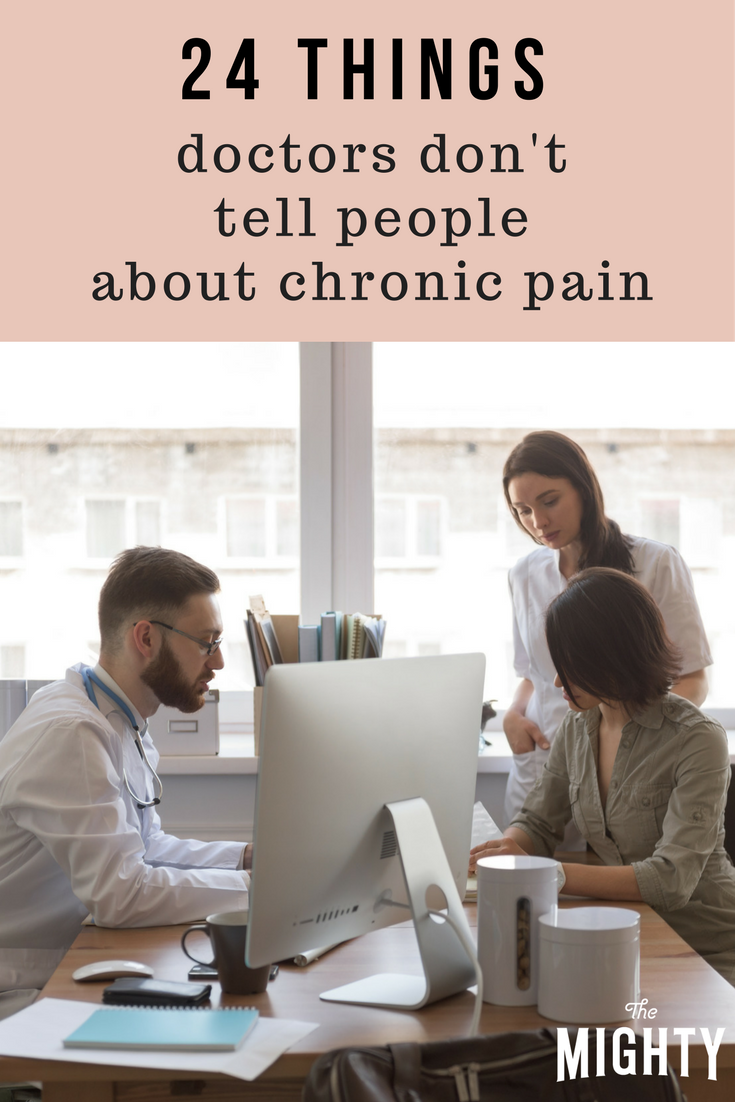When the average person gets sick or injured, they often go to the doctor, expecting to be diagnosed, treated and cured within a matter of days or weeks. Doctors are supposed to be the experts – the people you can trust and turn to for answers and relief from symptoms.
Unfortunately, this is not always the case when it comes to chronic pain. As with any chronic condition, there are no simple answers or one-size-fits-all treatments. The reality is that there simply isn’t enough research or knowledge of chronic pain conditions available yet, so many doctors are unable to effectively treat or prepare patients for a life with pain.
We asked our Mighty community to share what doctors didn’t tell them about chronic pain. It is difficult to understand how illness or pain can affect every aspect of an individual’s life unless you have experienced it yourself, but hopefully the following will help shed some light on what a patient might be able to expect after receiving a chronic pain diagnosis.
Here’s what the community shared with us:
1. “Doctors don’t tell you that chronic pain is not only physical! It causes a lot of mental and emotional turmoil as well, especially when the physical pain greatly affects your quality [of life] and keeps you from being able to do the things you want to.”
2. “My doctors never told me to forgive my body for no longer being able to do what it used to, to never compare myself to non-chronic pain people.”
3. “I think mostly they don’t validate how severe your pain is and how much it impacts your day-to-day living.”
4. “Exercise only works for some people. It’s not a cure-all.”
5. “They often won’t tell you [if] they have no idea how to treat you – even when you have a valid and medically recognized diagnosis, and they won’t tell you they have no intention of learning about your condition or helping you seek out a doctor who does know. They also don’t tell you that your condition [could] bankrupt you financially, no matter what kind of insurance you have, and that your care might be vastly better if you were living in a different state or country.”
6. “Doctors can sometimes make you feel like it’s just one piece of your life and that your relationships and your job, your dreams and goals should be relatively unaffected. That is never true of a chronic health problem.”
7. “Doctors don’t tell you that chronic pain is possible in your early 20s and that it will be lifelong. They [might] tell you it’s ‘in your head.’”
8. “It’s OK to refuse to take medications and treatments they suggest. Sometimes the side effects of medications are worse than our symptoms and it’s ultimately our right to make the decision to continue treatment.”
9. “They usually don’t tell you about the side effects: depression, random symptoms, negative effects on your social and work life, more difficulty focusing, etc. I wish I’d had some warning.”
10. “Doctors don’t tell you that everyone is different in treatment. Some people can and do get better with certain combinations of medications and others don’t. Numbers constantly change, new medications being added or taken away, off label prescriptions. New research is always coming in and a lot of doctors don’t even know about it yet.”
11. “Doctors don’t [often] tell you [if] they reach a point where they no longer know how to help you. They have exhausted all options. Ordering more tests and trying new meds are really just trial and error.”
12. “[They don’t tell you] how isolating and lonely it is. No one understands what being in constant pain is like unless they are in constant pain. And since no one understands, they don’t know what to say or how to treat you, so they stop coming around or reaching out to you as often. The loneliness is almost worse than the pain.”
13. “They [may not] refer you to a therapist. Chronic pain causes a lot of anger and grief over the life changes that go along with it. It took me years to seek one [out] on my own.”
14. “It has nothing to do with not being active or having a proper diet. It’s not being a hypochondriac, and you shouldn’t get shamed for it. When it rains, you hurt. When it’s sunny, you hurt, too. You never know what you’re going to face with another day.”
15. “Doctors don’t tell you that the amount of energy you put into blocking out your chronic pain can also cause you to block out pain you shouldn’t, like not noticing you have a kidney infection until it’s bad enough to put you in the hospital for days.”
16. “Doctors don’t tell you that they don’t really understand what it means to be in pain all day, every day, for the rest of your life (unless they personally deal with it). I once overheard my rheumatologist explain to a health care marketer that it was difficult to treat fibromyalgia patients because they required so much empathy that it was emotionally draining.”
17. “[I didn’t know] I’d be prescribed painkillers by doctors for my chronic pain and then be treated like a drug-seeker by doctors, the media and others.”
18. “[Doctors didn’t tell me] how to tell if the pain is from my chronic condition or something more serious. I end up at urgent care a lot because I will get a ‘new’ pain and I don’t know if it is a new symptom or something more serious. I am constantly [worried] that I am going to ignore it and it ends up being life-threatening.”
19. “Nothing will ever completely ease the pain and some days nothing, not even the strongest painkiller out there, will help it at all. You [often] have to settle for any improvement and adapt your life around pain.”
20. “[Doctors didn’t tell me chronic pain] will exhaust my brain so much I’ll become horribly forgetful. That stress can make it worse (I have fibromyalgia). That any new pain you have [may] be written off as your chronic pain, even if you know it’s something different.”
21. “They don’t tell you that at some point in your journey you have to make decisions based on the lack of true medical knowledge. That you will spend your life researching every aspect of your illness and will know more about your illness than your doctor ever would.”
22. “It’s a hard thing to prove, so a lot of people will think it’s phantom pain. You have to stick to the truth and stick up for yourself through it all.”
23. “They don’t tell you that inflammatory triggers (food, drink) can make pain worse.”
24. “My doctors haven’t given me any information on chronic pain. Only recently did they stop trying to say it was ‘all in my head.’ They still try to refuse to give me painkillers. Luckily the internet has been a huge help. Finding others who are going through the same thing and listening to what they do to cope has been a huge help!”


